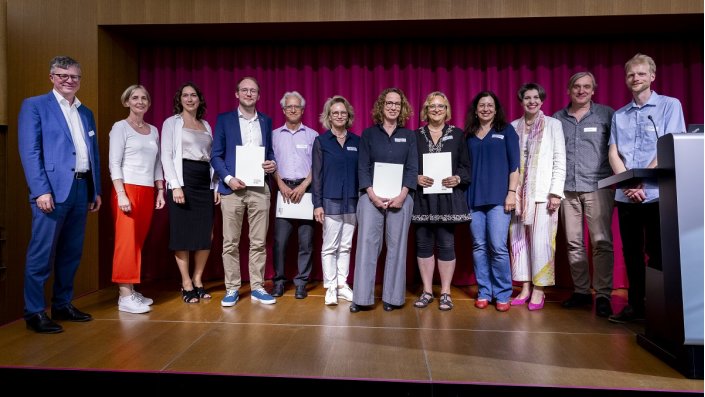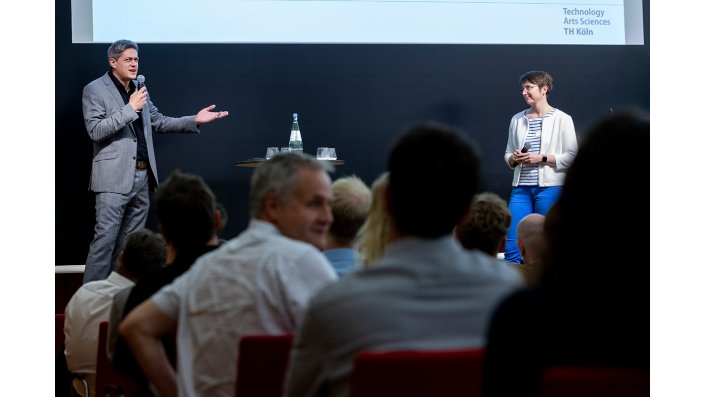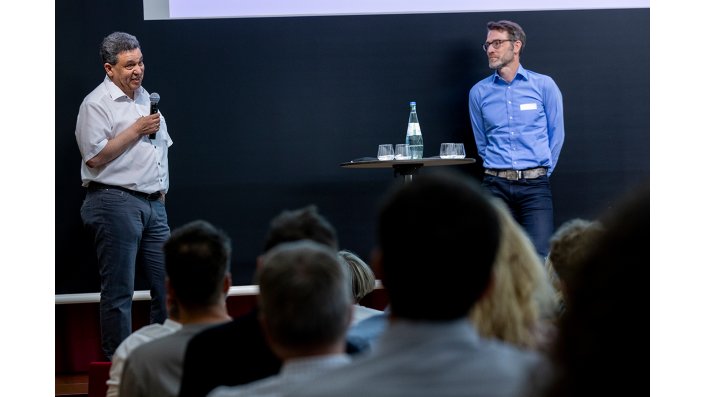Research and transfer achievements honoured
Spatial hearing for virtual and augmented reality applications, strengthening political representation of interests in social work, a social media action concept for open child and youth work and research into new active ingredients to combat muscle atrophy - these were the topics for which the science prizes were awarded on Research Day.
"TH Köln continuously pursues the goal of providing excellent research services and transferring the knowledge gained to society in order to promote social coexistence. The winners of the science awards and the nominees impressively demonstrate how this can be achieved. Another focus is the promotion of scientists at early career stages. I am therefore very pleased that we reached a new high in the number of doctorates last year," explains Professor Klaus Becker, Vice President for Research and Knowledge Transfer at TH Köln.
Focus on artificial intelligence
The theme of the Research Day 2024 was ‘Artificial Intelligence’. In addition to impulses from science and practice, current projects with an AI focus at TH Köln were presented and discussed on stage by various researchers. The focus was on the opportunities and risks of using the technology for research and society. The science awards were then presented.
Picture Gallery
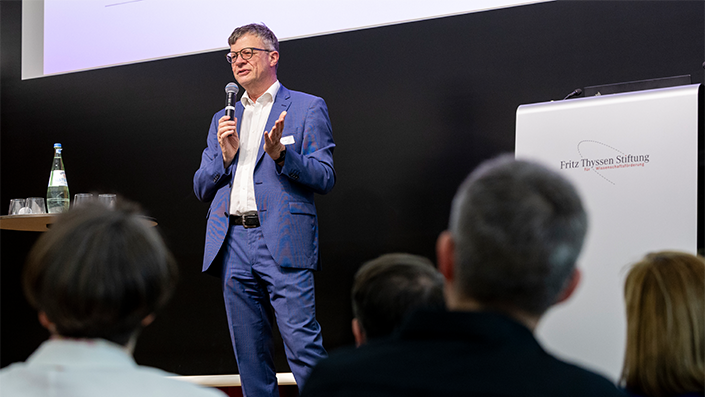 0 / 0
0 / 0
Professor Klaus Becker, Vice President for Research and Knowledge Transfer at TH Köln, moderated the event. (Image: Michael Bause/TH Köln)
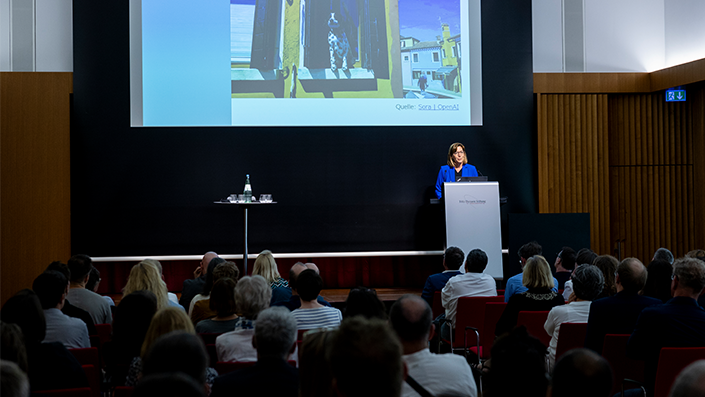 0 / 0
0 / 0
In her lecture ‘Journey through artificial intelligence: yesterday - today - tomorrow’, Professor Ingrid Scholl from Aachen University of Applied Sciences gave an overview of computer technology and AI since the 1950s. She gave examples of how AI can be used in the creation of texts, images and videos. (Image: Michael Bause/TH Köln)
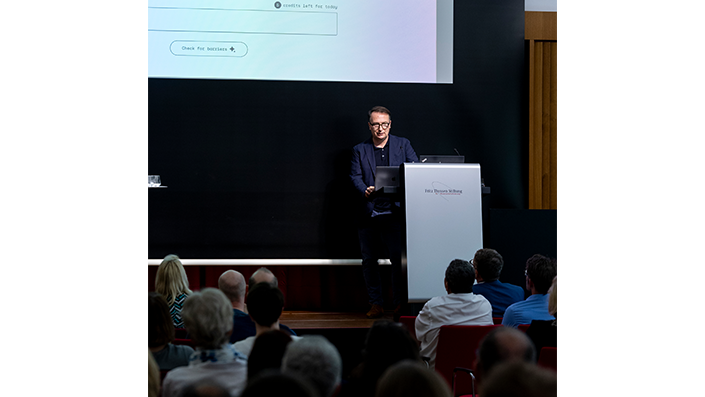 0 / 0
0 / 0
Marco Zingler from the digital agency Denkwerk GmbH focussed on a specific AI application in his presentation "Artificial intelligence and social innovation? A11y-AI - a tool for the empathic use of AI" focussed on a specific AI application: a tool to promote the accessibility of websites. (Image: Michael Bause/TH Köln)
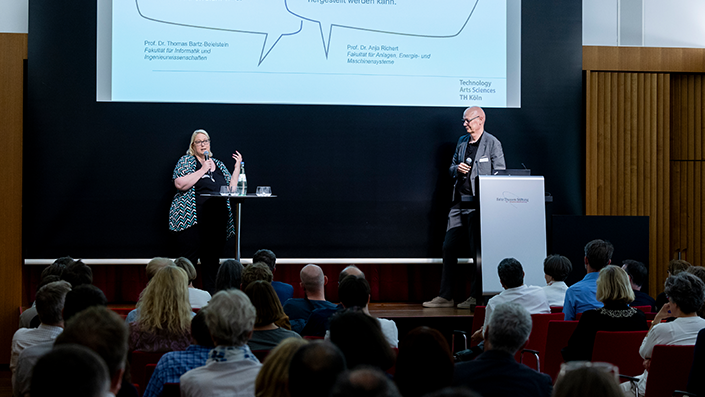 0 / 0
0 / 0
In addition, current projects focussing on AI at TH Köln were presented and discussed on stage by various researchers (here on the left: Professor Anja Richert, right: Prof Thomas Bartz-Beielstein) discussed on stage. (Image: Michael Bause/TH Köln)
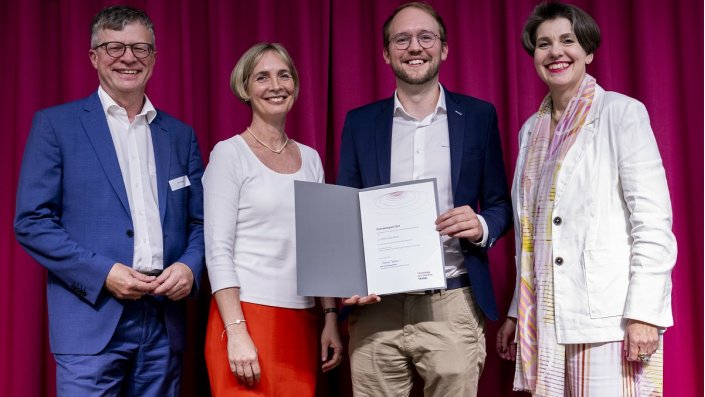 0 / 0
0 / 0
Dr Stefan Lukas Peters (second from right) received the doctoral prize of the Association of Friends and Sponsors of TH Köln. (Image: Michael Bause/TH Köln)
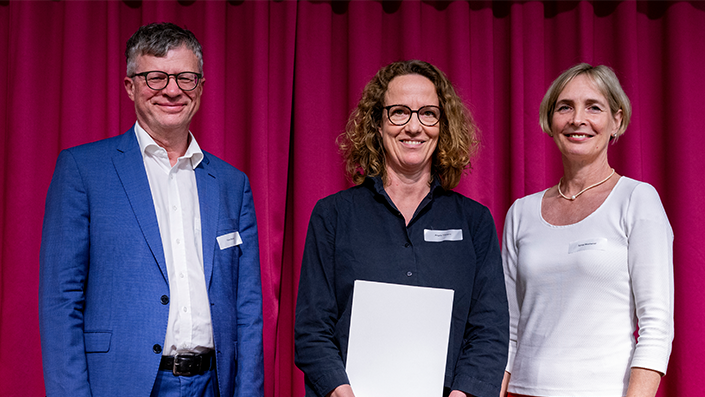 0 / 0
0 / 0
Professor Angela Tillmann (pictured right) and Dr Raik Rike Roth (not present) were awarded the Transfer Prize. (Image: Michael Bause/TH Köln)
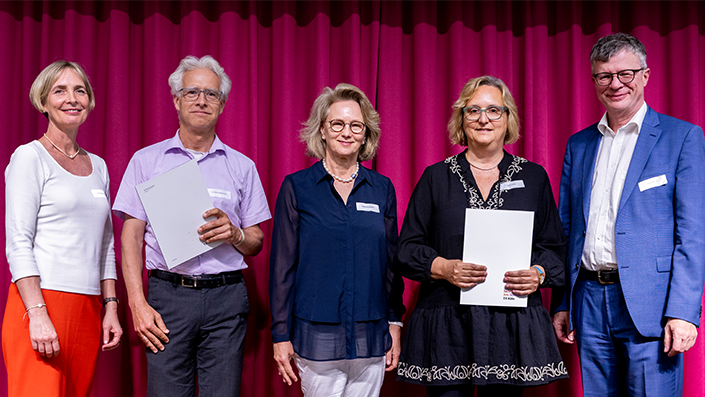 0 / 0
0 / 0
Both Professor Christoph Pörschmann (second from left) and Professor Sigrid Leitner (second from right) were honoured with the research prize. (Image: Michael Bause/TH Köln)
 0 / 0
0 / 0
Professor Michaele Völler (pictured right) and Professor Lasse Scherffig spoke about the danger of AI-generated fake news and the risk of standardising (visual) culture. (Image: Michael Bause/TH Köln)
 0 / 0
0 / 0
Professor Rolf Schwartmann (pictured left) and Professor Philipp Schaer agreed after their exchange that the greatest potential and the greatest risk of AI lies with humans. (Image: Michael Bause/TH Köln)
These are this year's award winners:
Research prize
The consistently high quality of the applications presented the jury with a particular challenge, so that for the first time two prizewinners will receive the research prize, which is endowed with 10,000 euros, and share the prize money.
Professor Christoph Pörschmann from the Institute of Computer Science and Communication Technology was honoured for his research in the field of ‘Virtual Acoustic Environments’. The issues he addressed in relation to spatial hearing are of central importance for applications in the field of virtual reality and augmented reality, such as teleconferencing systems and platforms for collaborative learning. According to the jury, his transdisciplinary work makes a valuable contribution to various areas of society, from medicine to art. Pörschmann is both highly publicised and successful in acquiring third-party funding. "In addition, he has built up an international and diverse team and a network of renowned research partners. He also supports scientists at early career stages by supervising doctorates," the jury said.
Professor Sigrid Leitner from the Institute for Social Policy and Social Management was also honoured. According to the jury, Leitner is a very well networked and committed researcher in the field of ‘social work as a political actor’. She is doing important pioneering work at the interface between the disciplines of social work, political science, social policy and sociology and is strengthening political strategies for the representation of interests in social work. Numerous publications and successful applications for third-party funding are proof of her research strength. "Her outstanding internal and external commitment to young academics deserves special mention. As Director, she was instrumental in establishing the “Social and Health” department in the NRW doctoral programme," explained the jury in its statement.
Transfer Prize
Professor Angela Tillmann and Dr Raik Rike Roth from the Institute for Media Research and Media Education received the transfer prize worth 5,000 euros for their project ‘Decoding Gender in Social Media’. The researchers developed a gender-reflective educational concept for action on social media for open child and youth work. Youth work professionals in particular receive orientation knowledge and starting points for working with social media and gender in everyday educational work. According to the jury, the project explicitly realises the goals of the transfer strategy of TH Köln. The project team has succeeded in creating a high level of visibility for the topic, which is reflected, among other things, in a large number of scientific publications and publications for practitioners.
Doctoral prize
Dr Stefan Lukas Peters received the EUR 2,000 doctoral prize from the Association of Friends and Sponsors of the TH Köln for his dissertation ‘Studies on the synthesis of new derivatives against sarcopenia and cachexia’. In his cooperative doctorate with Professor Hans-Günther Schmalz from the Faculty of Mathematics and Natural Sciences at the University of Cologne and Professor Sherif El Sheikh from the Faculty of Applied Natural Sciences at TH Köln, Peters researched new active substances against muscle atrophy. As part of his work, he investigated sarcopenia, i.e. age-related muscle wasting, and cachexia, where muscle wasting is caused by diseases such as cancer, chronic heart failure or chronic inflammation.
With his dissertation, Peters has created a recognised basis for the development of drugs to treat the restrictive ageing phenomena of sarcopenia and cachexia,
said the jury. It is a very valuable piece of research that makes an important contribution to social innovation in the field of mobility in old age. His work was awarded top marks and the reviewers were impressed by the prizewinner's achievements.
The jury members of the TH Köln science awards:
Prof. Dr Gernot Bauer, Münster University of Applied Sciences
Prof Andrea D. Bührmann, Georg-August-Universität Göttingen
Prof Iris Gräßler, Universität Paderborn
Prof Sonja Munz, Hochschule München
Prof Bettina Rockenbach, Universität zu Köln
Prof Martin Sternberg, Promotionskolleg NRW
There were also nominations in two award categories:
Research Award
Prof Dr Birgit Jagusch and Prof Dr Schahrzad Farrokhzad from the Institute for Migration and Diversity
Prof Udo Nehren from the Institute for Technology and Resources Management in the Tropics and Subtropics
Doctoral prize:
Dr Timo Breuer for his doctorate: ‘Reproducible Information Retrieval Research: From Principled System-Oriented Evaluations Towards User-Oriented Experimentation’, supervised by Prof Schaer, Institute of Information Science and Prof Dr Norbert Fuhr from the University of Duisburg-Essen
Dr Yasemine van Heuvel for her doctorate: ‘Optimisation of retroviral packaging cells for scale-up of vector production’, supervised by Prof Jörn Stitz, Faculty of Applied Natural Sciences and Prof Thomas Scheper from the Institute of Technical Chemistry at Leibniz Universität Hannover
May 2024
May 2024

